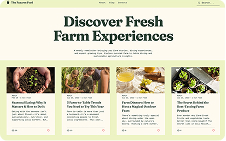- Oct 31, 2013
- 4 min read
Updated: Jul 20, 2025

In the days prior to the reign of social media and smartphones, independent food businesses were largely dependent on walk-in traffic, print media reviews and word-of-mouth buzz. In the digital age, though, customers increasingly access information, decide what to do with their time and make purchases online.
This makes for major opportunities among small, local food merchants. A low-quality vendor with a huge budget may still get lots of business just because he or she can afford the rent at that location just across from the bus station, but the smaller, more ambitious, artisanal bakery operating out of a home kitchen can now find success as well. With the right new media marketing and branding approach, everyone’s got a shot at a piece of the pie. (Sorry – we couldn’t resist throwing in that pun.)
Here are six tactics to consider trying out so your food business can be found online and you can get more customers buying your edibles.
1. Pin Success on Social Media
Social media is now a major part of how restaurants, bars, hotels, and similar businesses attract customers. About 90% use it for marketing, and nearly all food and beverage businesses—around 95%—are active on Facebook. Instagram is also popular, used by 80% to share updates and build interest. TikTok has quickly become a go-to for running ads and reaching new audiences.
While much user activity on social media is based around interacting with existing offline social circles, on Pinterest, activity is mostly based on shared interests. In this sense, it’s easier for small businesses to find new audiences on Pinterest than on other networks. And food is the most browsed and pinned nicheinterest category on Pinterest.
2. Publish Dynamic Content
Content marketing is about establishing authority by sharing expertise. The more helpful content about your food sub-niche that you publish, the higher Google will rank you for relevant keywords. And if your original, dynamic content truly provides value to your intended audience by addressing their interests, readers will share it with their peers and will keep coming back for more.
Get going with your blog right away so your pages can start getting indexed, which can take time! You can start by posting some of your favorite tips and hacks for the kitchen – those are always good fun.
3. Get Active on Niche Food Photo Communities
When it comes to small food brand exposure via photo sharing communities, Pinterest is just the beginning. Opportunities await on super-targeted communities that you might or might not have heard of, including Foodily, Instagram, Purpple, Kitchen Artistry, dishPal and food-oriented groups on Flickr. Check out a great list here.
Some of these platforms might have relatively small reach, but the people there are already self-selected to be interested in what you’re offering.

4. Enable Online Ordering
Depending on what kind of food you sell, you might already be using your website as an eCommerce property. This is essential if your edibles are packaged and can easily be shipped.
But even if your product needs to be served within minutes of preparation, the potential for online ordering to improve your sales is huge. Both restaurateurs and food consumers are highly interested in electronic payment options and digital self-service ordering. The days of using your website strictly as a business card are clearly long gone.
Whether you’ve got a swanky restaurant, a short order counter service establishment or a food delivery brand, there’s plenty you can do. The Wix App Market has a bunch of apps made for these types of functions, with tools for table reservations, ordering, transmitting funds and more.
5. Optimize for Local Search
Google receives over two billion searches each month with local intent – and that’s just from desktop computers in the US. Over half of all mobile searches use location-related keywords. These metrics make a lot of sense when you consider that the internet is a perfect resource for busy people who are looking for things to do with little advance notice.
Make sure these people can find you by publishing content about your locale (mentioning your city, region neighborhood and zip code), related businesses in your area, and relevant events taking place around you.
Double check that you’re listed on as many local directories as possible, too. You should reference Hubspot’s handy list of 50 locally indexed business directories to appear on, but you can start with Moz’s Getlisted.org, a search engine for local listing sites, to see where you currently stand. The Wix-integrated Site Booster app, meanwhile, will handle many key listing submissions on your behalf for under $6 per month.
If organic local search results are too competitive in your area, pay-per-click ad networks from Google and Facebook can give you a boost with geo-targeted campaign settings.
6. Go Mobile
When people get hungry at home, they might wonder where to get food, or they might raid their own fridges. But when people are out and about, especially in an area unfamiliar to them, they’ll turn to their smartphones for advice. Make sure your site looks good on mobile devices, so these prospects don’t get a bad taste in their mouths. Thankfully, with Wix's mobile website builder, publishing a mobile-friendly version of your site is free and painless.




















